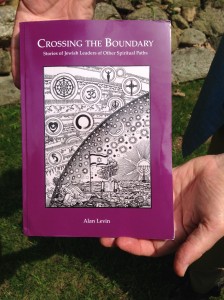When modern Jews cross the boundary to other spiritual paths, there is often little resistance from family and friends. There are exceptions. Of the fourteen I interviewed for Crossing the Boundary, three had families with strong objections who made attempts to intervene. Psychiatrists were hired and in one case a deprogrammer, to change the direction of the spiritual seeker. Generally, the more Orthodox the family, the more resistance. When it comes to boundaries, the Orthodox have strong ones, and the ultra-Orthodox, the Haredi or Hasidic,* have ultra-strong ones.
I just finished reading the memoir of Shulem Deen, All Who Go Do Not Return.* Deen tells the chilling story of life in the ultra-Orthodox community of New Square, NY, where the Skverer Jews make their home. He goes on to share his slow but steady awakening to the completely alien world of modern America and his growing doubts about the rules and beliefs of his people. The children of New Square are raised in the most insular of the insular, where even the practices and choices of the ultra-Orthodox neighboring areas are frowned upon. The schools barely teach English, let alone any skills that might enable employment outside their community. Connections to the wider society, computers, TV, etc. are taboo. As with cults in general, those outside the group are viewed with suspicion and believed to “hate us.”
He describes with clarity and honesty his feelings and inner thought processes as a child giving vivid testimony to what happens to the natural questioning mind when the prime directive is, “Obey.” Obey the commandments; obey the rabbi’s interpretation of the commandments; obey the rules and codes of the community. And he shares what happens to those who don’t, including ostracism, harassment, violence and excommunication. Yet, year after year, his questions grew and his doubts mounted to where he no longer believed any of it, not even the fundamental belief of Judaism: that there is a God.
Deen ultimately crossed the boundary to secular American life. His experiences in the Haredi world led him to be an unbeliever, a heretic, an apostate, and yet it took a great deal of courage to leave the familiar world in which he grew up and face the uncertainty of life outside the protective physical and psychic walls of the Skverer community. The price he paid was to lose his family and almost his mind. It’s a powerful story and very well told. Like the stories in Crossing the Boundary, it has relevance to all of us, Jews and non-Jews, religious, spiritual or secular.
While the boundaries of the ultra-Orthodox are extremely intense, they are also quite clear. Most of us deal with boundaries that are more difficult to see and therefore are often more hidden from awareness. We may scoff at those with extremely rigid religious beliefs, but still be unable to hear or open to understandings and experiences of reality that challenge our own. It’s always struck me as ironic that the so-called “new atheists” have such a strong belief in the denial of any reported experiences that might point beyond a strict materialist view of the universe. While some religious people deny empirical science that contradicts a literal reading of their scriptures, these atheists will discount all reports of esp phenomena, near-death and out-of-body experiences, energy healing, etc. because those observations contradict the theory that consciousness arises from matter, human brain matter.
At the end of his book, Shulem tells us that he is still on his journey of discovery. I wish him the best in opening to the many threads of human wisdom, including the spiritual lineages, for their gifts. He will find that this can be done freely, without having to buy into the patriarchal and coercive group pressures of the hierarchical institutions that make claim to these teachings and distort them.
Notes: The terms ultra-Orthodox and Haredi are non-judgmental terms used to describe Orthodox Jews who dress and seek to maintain the very strict ways of religious Jews from the specific areas of Europe from which they emigrated. Chasidic (or Hasidic) Jews are one branch of the Haredi. The Skverer are as well. See: https://en.wikipedia.org/wiki/Haredi_Judaism
All Who Go Do Not Return: A Memoir, by Shulem Deen, Graywolf Press, Minn. 2015
